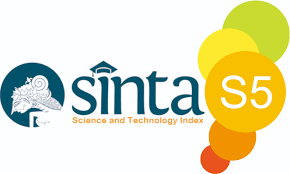Generasi Millennial Dalam Tujuan SDG’s: Tujuan Pekerjaan Layak Dan Pertumbuhan Ekonomi (Studi Kasus Mahasiswa Universitas Mulawarman)
DOI:
https://doi.org/10.30872/geoedusains.v5i1.3691Keywords:
Millennial Generation, SDG's, Decent Work, Economic Growth, Mulawarman UniversityAbstract
The Millennial Generation is an indicator that is expected to be able to compete in the digital era and be able to create a golden generation in 2045. This research aims to describe the opinions of the millennial generation regarding the SDG's goals: decent work goals and economic growth (case study of Mulawarman University students). The research method used is descriptive. Data collection techniques use questionnaires and documentation. Data analysis techniques use Miles and Huberman. The results of research from 344 respondents showed that 71% of Mulawarman University students were interested in entering the world of work after graduating from college and the percentage of becoming employees was 38.2%, 30.3% opened up employment opportunities and 31.5% chose others. Mulawarman University students have a very high level of worry about the future which also influences their thinking patterns, namely 85% and often compare themselves with other people, namely 61.5%. Opinions on how to realize SD's goals of decent work and economic growth by providing opinions about interests and promising economic sectors in the future, namely agriculture at 9%, animal husbandry 18.9%, mining 2.9%, technology and digital 35.2% , finance 1.5%, trade 2.9%, health 19.5%, fashion 1.7%, plantations 2%, others 6.4%. The research results show that Mulawarman University students' opinions regarding decent work and economic growth in the future are more about utilizing technology and digital.
Downloads
References
Ari Widiati, F. (2021). Analisis Motivasi Berwirausaha Pada Generasi Milenial Di Kota Pontianak. Jiseb, 2(1), 73–81.
Hastini, L. Y., Fahmi, R., & Lukito, H. (2020). Apakah Pembelajaran Menggunakan Teknologi dapat Meningkatkan Literasi Manusia pada
Generasi Z di Indonesia? Jurnal Manajemen Informatika (JAMIKA), 10(1), 12–28. https://doi.org/10.34010/jamika.v10i1.2678
Hutauruk, M. R. (2020). Pengaruh Pandemi Covid-19 Terhadap Faktor Yang Menentukan Perilaku Konsumen Untuk Membeli Barang Kebutuhan Pokok Di Samarinda. Jurnal Riset Inossa, 2(June), 1–15.
Ilmiah, J., Syariah, K., Remaja, D. K., & Aryadi, A. R. (2022). Eco-Iqtishodi Pengaruh Penerapan Sistem Ekonomi Syariah Eco-Iqtishodi. 3.
Natalia, C., & Rodhiah, R. (2019). No Title. . . Jurnal Manajerial Dan
Kewirausahaan, 1(2), 164–171.
https://journal.untar.ac.id/index.php/JMDK/article/view/5075
Peramesti, N. P. D. Y., & Kusmana, D. (2018). Kepemimpinan Ideal Pada Era
Generasi Milenial. TRANSFORMASI: Jurnal Manajemen Pemerintahan, 73–
https://doi.org/10.33701/jt.v10i1.413
Perdana, A. (2019). Generasi Milenial dan Strategi Pengelolaan SDM Era Digital.
Jurnal Studi Pemuda, 8(1), 75.
https://doi.org/10.22146/studipemudaugm.45287
SARI, S. (2019). Literasi Media Pada Generasi Milenial Di Era Digital. Profesional: Jurnal Komunikasi Dan Administrasi Publik, 6(2), 30–42. https://doi.org/10.37676/professional.v6i2.943
Savitri, D., & Muis, T. (2014). Survey Tentang Pilihan Karir Mahasiswa Fakultas Ilmu Keolahragaan Universitas Negeri Surabaya. Jurnal BK UNESA, 4 (3). https://ejournal.unesa.ac.id/index.php/jurnal-bk-unesa/article/view/8755
Yusuf, M. (2019). Pengaruh Kemajuan Teknologi dan Pengetahuan terhadap
Minat Generasi Milenial dalam Berinvestasi di Pasar Modal. Jurnal
Dinamika Manajemen Dan Bisnis, 2(2), 86–94. https://doi.org/10.21009/jdmb.02.2.3
Zis, S. F., Effendi, N., & Roem, E. R. (2021). Perubahan Perilaku Komunikasi
Generasi Milenial dan Generasi Z di Era Digital. Satwika : Kajian Ilmu
Budaya Dan Perubahan Sosial, 5(1), 69–87. https://doi.org/10.22219/satwika.v5i1.15550
Downloads
Published
Versions
- 2025-05-22 (2)
- 2024-07-14 (1)
Issue
Section
License
Copyright (c) 2024 Aisyah Trees Sandy, Afra Salimah Anggraini, Selvi Nur Khalisa, Jusmawati Jusmawati, Endang Ratnawati, Rahmadi Rahmadi, Juwari Juwari

This work is licensed under a Creative Commons Attribution-ShareAlike 4.0 International License.










